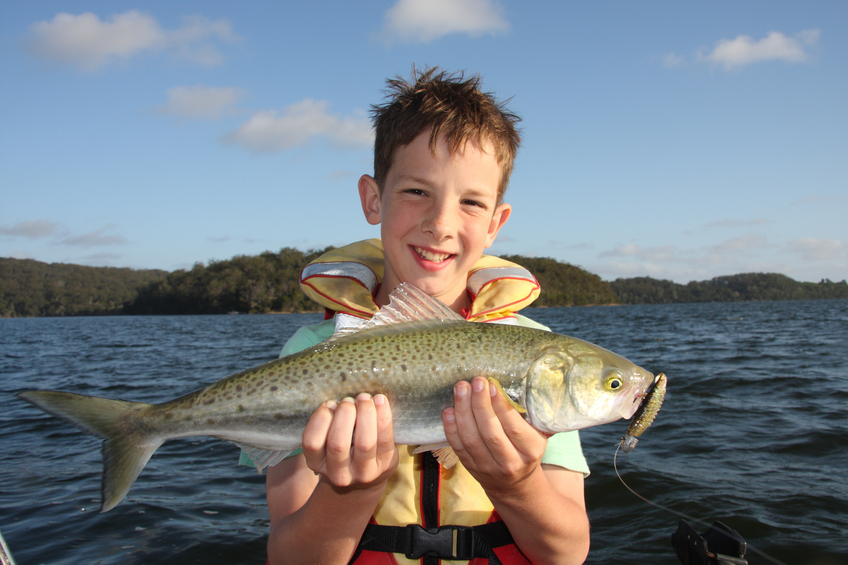Evolutionary scientists find surprising new link between humans and fish


A free daily email with the biggest news stories of the day – and the best features from TheWeek.com
You are now subscribed
Your newsletter sign-up was successful
Since the work of Charles Darwin, it has been more or less accepted that people, horses, porpoises, and bats share a common ancestor — one that's arms and digits developed over many, many years to suit its needs. But only recent research has revealed that the human hand is actually extremely similar to the fin of a fish.
Although you wouldn't know it comparing your hand side-by-side with a trout (and might only guess it watching Michael Phelps swim), human fingers and fish fins "follow some of the same rules," The New York Times reports. In hands, we have a kind of tissue called "endochondral bone"; fish, however, have only small endochondral bones at the tip of their fin, the rest of the fin being made of rays of dermal bone. But by toggling with two genes related to limbs, scientists realized that the same cells in fish and in tetrapods either ask the body to develop dermal bones or endochondral bones.
The new discovery could help make sense of the intermediate fish with limb-like fins that [evolutionary biologist Dr. Neil H. Shubin] and his colleagues have unearthed. These animals still used the molecular addresses their ancestors used. But when their cells reached their addresses, some of them became endochondral bone instead of fin rays. It may have been a simple matter to shift from one kind of tissue to another. [The New York Times]
"Here we're finding that the digits and the fin rays have some sort of equivalence at the level of the cells that make them. Honestly, you could have knocked me over with a feather — it ran counter to everything that I was expecting after working on this problem for decades," Dr. Shubin told The New York Times.
The Week
Escape your echo chamber. Get the facts behind the news, plus analysis from multiple perspectives.

Sign up for The Week's Free Newsletters
From our morning news briefing to a weekly Good News Newsletter, get the best of The Week delivered directly to your inbox.
From our morning news briefing to a weekly Good News Newsletter, get the best of The Week delivered directly to your inbox.
A free daily email with the biggest news stories of the day – and the best features from TheWeek.com
Jeva Lange was the executive editor at TheWeek.com. She formerly served as The Week's deputy editor and culture critic. She is also a contributor to Screen Slate, and her writing has appeared in The New York Daily News, The Awl, Vice, and Gothamist, among other publications. Jeva lives in New York City. Follow her on Twitter.
-
 The environmental cost of GLP-1s
The environmental cost of GLP-1sThe explainer Producing the drugs is a dirty process
-
 Greenland’s capital becomes ground zero for the country’s diplomatic straits
Greenland’s capital becomes ground zero for the country’s diplomatic straitsIN THE SPOTLIGHT A flurry of new consular activity in Nuuk shows how important Greenland has become to Europeans’ anxiety about American imperialism
-
 ‘This is something that happens all too often’
‘This is something that happens all too often’Instant Opinion Opinion, comment and editorials of the day
-
 Blue Origin launches Mars probes in NASA debut
Blue Origin launches Mars probes in NASA debutSpeed Read The New Glenn rocket is carrying small twin spacecraft toward Mars as part of NASA’s Escapade mission
-
 Dinosaurs were thriving before asteroid, study finds
Dinosaurs were thriving before asteroid, study findsSpeed Read The dinosaurs would not have gone extinct if not for the asteroid
-
 SpaceX breaks Starship losing streak in 10th test
SpaceX breaks Starship losing streak in 10th testspeed read The Starship rocket's test flight was largely successful, deploying eight dummy satellites during its hour in space
-
 Rabbits with 'horns' sighted across Colorado
Rabbits with 'horns' sighted across Coloradospeed read These creatures are infected with the 'mostly harmless' Shope papilloma virus
-
 Lithium shows promise in Alzheimer's study
Lithium shows promise in Alzheimer's studySpeed Read Potential new treatments could use small amounts of the common metal
-
 Scientists discover cause of massive sea star die-off
Scientists discover cause of massive sea star die-offSpeed Read A bacteria related to cholera has been found responsible for the deaths of more than 5 billion sea stars
-
 'Thriving' ecosystem found 30,000 feet undersea
'Thriving' ecosystem found 30,000 feet underseaSpeed Read Researchers discovered communities of creatures living in frigid, pitch-black waters under high pressure
-
 New York plans first nuclear plant in 36 years
New York plans first nuclear plant in 36 yearsSpeed Read The plant, to be constructed somewhere in upstate New York, will produce enough energy to power a million homes
